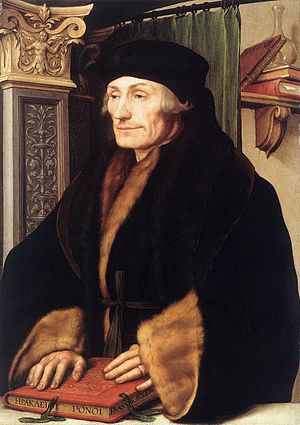Desiderius Erasmus Roterodamus (27 October 1466 ? 12 July 1536), known as Erasmus of Rotterdam, or simply Erasmus, was a Dutch Renaissance humanist, Catholic priest, social critic, teacher, and theologian.Erasmus was a classical scholar who wrote in a pure Latin style. Amongst humanists, he enjoyed the sobriquet "Prince of the Humanists"; he has been called "the crowning glory of the Christian humanists". Using humanist techniques for working on texts, he prepared important new Latin and Greek editions of the New Testament. These raised questions that would be influential in the Protestant Reformation and Catholic Counter-Reformation. He also wrote On Free Will, The Praise of Folly, Handbook of a Christian Knight, On Civility in Children, Copia: Foundations of the Abundant Style, Julius Exclusus, and many other works.Erasmus lived against the backdrop of the growing European religious Reformation; but while he was critical of the abuses within the Church and called for reform, he kept his distance from Luther and Melanchthon and continued to recognise the authority of the pope. Erasmus emphasized a middle way, with a deep respect for traditional faith, piety and grace, and rejected Luther's emphasis on faith alone. Erasmus therefore remained a member of the Catholic Church all his life.Erasmus remained committed to reforming the Church and its clerics' abuses from within. He also held to Catholic doctrines such as that of free will, which some Reformers rejected in favour of the doctrine of predestination. His middle road approach disappointed and even angered scholars in both camps.Erasmus died suddenly in Basel in 1536 while preparing to return to Brabant, and was buried in the Basel Minster, the former cathedral of the city. A bronze statue of him was erected in his city of birth in 1622, replacing an earlier work in stone.Erasmus was his baptismal name, given after St. Erasmus of Formiae. Desiderius was a self-adopted additional name, which he used from 1496. The Roterodamus in his scholarly name is the Latinized adjectival form for the city of Rotterdam.

Alias
Erasmus, Desiderius Roterodamus; Erasmus of Rotterdam
Fecha de nacimiento
1466-10-28
Año de nacimiento
1466
Fecha de defunción
1536-07-12
Año de defunción
1536
Era
Renaissance philosophy
Principal interés
Christian philosophy
Renaissance humanism
Región
Western philosophy



Aipatu
0